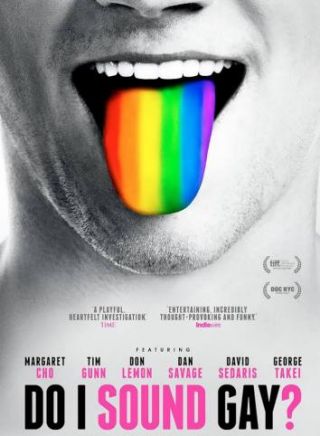Sexual Orientation
"Do I Sound Gay?"
Gay men, internalized homophobia, and (re)defining the "gay voice"
Posted July 20, 2015
A collaborative piece between Dr. Kevin L. Nadal, author of "That’s So Gay! Microaggressions and the Lesbian, Gay, Bisexual, and Transgender Community" and Dr. E. J. R. David, editor of "Internalized Oppression: The Psychology of Marginalized Groups."

“Do I Sound Gay?”—one of summer 2015’s must see documentaries according to Entertainment Weekly—is a new film by David Thorpe, a gay White American writer based in Brooklyn, New York. The movie explores Thorpe’s dislike of the sound of his voice, which he classifies as nasally, high-pitched, and undesirable. He believes that his voice has negatively affected many aspects of his life—his self-esteem, his success, and even romantic relationships. In fact, the film begins with Thorpe questioning how he could possibly find a man to love him because of this dreadful voice that he perceives himself to have.
Through a series of interviews and interactions with Thorpe’s friends and relatives, a few celebrities, and random strangers on the streets, we hear a spectrum of perspectives about what “sounds gay” and why sounding as such is perceived as bad. Many of the gay men in the film admit to being quite comfortable with the sounds of their voices, not fully understanding why Thorpe would feel so strongly about his voice that he would even visit a speech pathologist and a celebrity vocal trainer to get rid of his “gay voice.” However, most of the gay men in the film were able to relate to the insecurity of having a more feminine voice and some even recalled times that their “gay sounding” voices (and general gay identities) had led to getting bullied or worse.
Overall, the film does a nice job of exploring a very real but largely unseen, unheard, and perhaps unspoken psychological struggle that many gay men may have.
Internalized Homophobia: An Unseen and Unheard Psychological Struggle
As psychology professors and researchers, the first thing that popped into our minds while watching the film was the concept of internalized oppression, particularly internalized homophobia* (please see note below about the term “homophobia”), which may be defined as the negative attitudes that LGBTQ people have about themselves because of their sexual orientations.
We believe internalized homophobia is why a gay man would dislike sounding feminine. Internalized homophobia is why a gay man would dislike “sounding gay.” We believe internalized homophobia is why “sounding less like a man” would make a gay man view himself as inferior and undesirable, even to the eyes (or ears) of other gay men.
It is important to note that people are not born having negative attitudes about themselves or perceiving their characteristics as inferior or undesirable; self-hate is taught and learned. In this regard for our LGBTQ brothers and sisters, research suggests that people develop internalized homophobia because they learned that being different or gender nonconforming was bad (from their families, friends, society in general) and so they also learned not to love themselves. In other words, people have internalized, accepted, or believed the homophobic messages that society has imposed upon them. So being stressed out and psychologically bothered by “sounding gay"—to the point that one’s self-esteem and other aspects of one’s life are negatively affected—is a very telling “symptom” of internalized homophobia.
Several other interviewees in the movie also shared other common concepts that are related to, if not signs of, internalized homophobia, including “passing” (i.e., being presumed to be a member of the “dominant group”) and “code-switching “(i.e., changing behaviors based on the different environments or situations that one is in). For example, author David Sedaris talked about instances in which others may have presumed that he was heterosexual and he retrospectively ponders what many gay men may also wonder: “Why does passing as straight make me feel good?”—another likely sign of internalized homophobia.
The film also introduced us to the notion of how other forms of internalized oppression (e.g., internalized racism) may affect other marginalized communities. Don Lemon, a Black American CNN reporter, described how he modified his Southern accent so that he could be successful on TV. Margaret Cho, a Korean American comedian, discussed how her parents learned to speak English perfectly so that they would be seen as “real” Americans. These examples begin to touch on the notion that different marginalized communities may have similar lived experiences and psychological struggles.
Intersecting Identities and Multiple Internalized Oppressions
Where we wish the film went further was to discuss how these intersectional identities affect people in all aspects of their lives, particularly in their voices. As Filipino Americans, we know too what it’s like to want to sound (and look, act, think, and be accepted as) “American”. We understand the psychological toll that comes with wanting to fit in with the dominant group and, in the process, coming dangerously close to losing – if not rejecting—another important part of our identity.
In addition, as a gay man, the first author (Kevin) also knows what it’s like to be ostracized for his high-pitched, loud, and flamboyant voice. This widespread societal marginalization of the “gay voice” and pretty much everything that is “gay” is very real, as most if not all of us are socialized or taught to associate negativity, inferiority, and “otherness” with being gay. As a heterosexual man who grew up with strong flavors of “machismo” in the Philippines and paternalism in the United States, the second author (E.J.) can attest to this widespread homophobia as he has witnessed – and even participated in – many such instances of othering, teasing, and bullying gay men, especially those who speak with high-pitched, highly-feminine, and flamboyantly “gay voices.”
Thus, the code switching that LGBTQ people may need to do to navigate and survive through such pervasive (and painful!) oppression can become something that is so ingrained and automatic that they often don’t even think about it, but it is nevertheless very exhausting! So what about LGBTQ people of color: do their multiple, intersecting identities and the constant juggling that comes with having such identities – along with the potential for developing multiple internalized oppressions – exponentially increase the psychological stressors they face?
Combatting Internalized Homophobia and Re-Defining the “Gay Voice”
By the end of the film, Thorpe proclaimed that he has become comfortable with the “gayness” of his voice. We believe, however, that two of the other celebrity interviewees—Dan Savage and Tim Gunn—more profoundly sum up the perfect combination of what many gay men struggle with when it comes to their voices.
Author Dan Savage states that their voices are the “last chunk of internalized homophobia” that gay men struggle with. Indeed, many are openly gay in every aspect in their lives. They have strong gay male friendships and even stronger romantic relationships and partnerships. They march in LGBTQ Pride Parades and advocate for civil rights issues like marriage equality, employment non-discrimination, immigration, and transgender rights. Yet, perhaps many still don’t like the sound of their own voices and in some contexts, even for a second, think to “butch up” their voices to “pass” as “normal”.
These experiences are consistent with research that the second author (E.J.) has conducted on internalized oppression. Research suggests that oppression—in this case homophobia or heterosexism—can be internalized so deeply that even those of us who are most aware, most critical, and most “liberated” (or “decolonized” as some other marginalized peoples may refer to it) may still be affected by it. Even further, research suggests that internalized oppression has an “implicit” and automatic component in that even though we may outwardly display pride about who we are, we may still have a sense of inferiority inside that may influence us beyond our awareness, intention, or control.
So for our LGBTQ brothers and sisters, they can love themselves and be proud of their identities, but that little piece of internalized homophobia might always exist. And why wouldn’t it? For many, they are dealing with decades—lifetimes—of hateful messages, from which they learned that being LGBTQ was bad or even evil.
Despite this, we’d like to think that we could at least begin to combat internalized homophobia simply by changing the definition of “normal.” In this case, instead of viewing nasally, high-pitched voices as being bad, let’s change the narrative and view them as fabulous. One of the celebrity interviewees in the documentary, Project Runway Host Tim Gunn, stated it best when he said:
“Now, when people say ‘You sound gay,' I simply turn to them and say ‘Thank you!’”
Kevin L. Nadal, Ph.D., is an Associate Professor of Psychology at the City University of New York, the Executive Director of CLAGS: The Center for LGBTQ Studies, and the author of That’s So Gay! Microaggressions and the Lesbian, Gay, Bisexual, and Transgender Community. Learn more about his work here or follow him twitter.
E. J. R. David, Ph.D., is an Associate Professor of Psychology at the University of Alaska Anchorage. His work on the psychological experiences of marginalized peoples has resulted into two books, Internalized Oppression: The Psychology of Marginalized Groups and Brown Skin, White Minds: Filipino American Postcolonial Psychology. Learn more about his work here or follow him on twitter.
*Note: Instead of “homophobia,” some folks may use the term “heterosexism” – and in this case “internalized heterosexism” – which has been argued to be a more appropriate term given that anti-LGBTQ prejudice is not just an individual-level, clinical-sounding problem (as the term “phobia” implies), but is also a widespread form of oppression that is rooted in our culture, society, and institutions. For this piece, however, we use the term “homophobia” as it is more recognized by the general society and is the term heard often in the “Do I Sound Gay?” movie.
*An earlier version of this piece was also posted at Springer Publishing Company's Blog.




